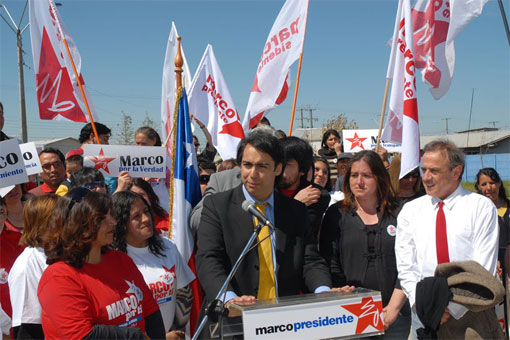November 18, 2009
In the lead up to Chile’s presidential election on December 13, Marco Enríquez-Ominami has burst dramatically onto the country’s political scene. The 36-year-old dissident candidate—or díscolo, in Chilean political parlance—has shaken up the race by adding a new dynamic of competition and offering an exciting alternative presidential candidacy.
Enríquez-Ominami (or ME-O as he his colloquially known) is shaking up what had become a stale—indeed boring—pattern of post-authoritarian political competition. Since Chile’s return to democracy in 1990, the center-left Concertación alliance, of which Enríquez-Ominami was once a member, has governed Chile. It is the country’s longest-lived and most successful coalition, capturing the presidency four times, each in two coalition contests against the center-right Alianza (now known as the “Coalition for Change”).
Surprisingly, polls show Enríquez-Ominami slightly trailing the Concertación’s mainstream candidate, Christian Democrat Eduardo Frei. A poll published by the Center for Public Studies (CEP) on November 11 shows ME-O at 19 percent and Frei at 26 percent support. Center-right businessman Sebastian Piñera leads all three candidates and is likely to receive 36 percent of the vote. But with a majority out of reach for all three candidates, it is far from certain as to who will face off in the second round of voting in January.
To understand more about Chile’s intriguing candidate, Patricio Navia, a master teacher at New York University, sat down for a series of conversations with the discolo candidate—the basis for his excellent and timely new book, El Díscolo, Conversaciones con Marco Enríquez-Ominami. Their discussions, combined with Navia’s own analysis of Enríquez-Ominami’s rise to prominence, touch upon what is right and what is wrong with contemporary Chilean politics.
Though released shortly before the elections, this is not a campaign book—far from it. The book is really an exploration of the potential fault lines of Chilean democracy. However, it goes even further than this to provide hard-hitting political analysis and commentary by pairing one of Chile’s most astute political observers with one of the continent’s most promising young political voices—a conversation not to be missed by devotees of Chilean politics.
Concertación governments have been lauded for their quality of governance and for providing stability and economic growth that are the envy of the continent. Nonetheless, there is a simmering political discontent in Chile, which Enríquez-Ominami has tapped into to build a new alternative political movement. Michelle Bachelet, the country’s first female president and telegenic leader who pulled the Concertación to a narrow victory in 2006, has an unprecedented approval rating of over 70 percent. Though she is prohibited from re-election, her numbers would seem to set the stage for a victory of whomever the Concertación nominated.
However, Chileans love their “motherly” (as they describe her) president much more than they love the coalition that brought her to power (Navia calls her rule a “cariñocracia”—or “affectionocracy”). The problem is that the Concertación’s success has been built on a political model that relied on a series of informal and formal agreements cut between elites to ensure the success of the democratic transition and prevent destabilizing change. These deals have excluded the broader public and have led to Chileans’ declining confidence in political parties and democracy itself. As the geriatric coalition enters its third decade, Chileans have tired of its entrenched, elite-dominated politics.
In the lead up to the December 2009 elections voters initially faced a choice between the colorless but able leadership of Frei and challenger Piñera, with both perceived as representatives of the status quo. Enríquez-Ominami changed the game, preaching a new “citizen politics” and rallying against the “elitist,” “monarchical” and “entitled” bearing of his presidential contenders.
Navia provides a useful, but perhaps too lengthy, introduction that takes roughly a third of the book. But he also offers an in-depth analysis of Chilean democracy since the democratic transition, and how the country’s political model has alienated the public. Still the bulk of Navia’s work, and its richest part, is devoted to the back and forth dialogue between him and Ominami.
The book provides nuanced, fun, intellectually spirited, and enlightening debates about what is wrong with Chilean politics, and how Enríquez-Ominami would fix them by introducing a citizen democracy—a concept that means providing people more voice and putting Chileans more in touch with their government. Navia and ME-O look at recent political changes and how Chile has gone from a model transition characterized by stable competition between two alliances to one where a dark horse, semi-populist candidate can emerge from nowhere to challenge an emerging partidocracia.
More doubtful than the book’s terrific account of the development of elitist politics is whether Enríquez-Ominami would in fact be a transformative leader. Though Navia appears a bit too seduced with the ME-O phenomenon, he does call the candidate the “illegitimate son” of Bachelet in political terms. Navia rightly notes that ME-O is an “outsider,” yet the discourse that made ME-O a presidential contender is virtually the same as that used by Bachelet.
Even if elected, which is unlikely given the stubbornly entrenched history of Chile’s two-coalition pattern, ME-O remains a more a legitimate son than Navia thinks. As president, ME-O would face the same opposition from entrenched elites that Bachelet faced, and like Bachelet, would be eventually forced to rely on the same elitist model to govern.
As was the case for Bachelet, ME-O talks about a new form of citizen politics, yet he provides little account of what this would concretely look like. Navia does his job by providing readers a lively and enlightening diagnosis of what ails the Chilean political system, but ME-O falls short in providing a concrete prescription for a potential cure. Nonetheless, Navia’s book is an excellent read, documenting the rise of someone who might someday, though unlikely in 2009, be elected president of Chile.






